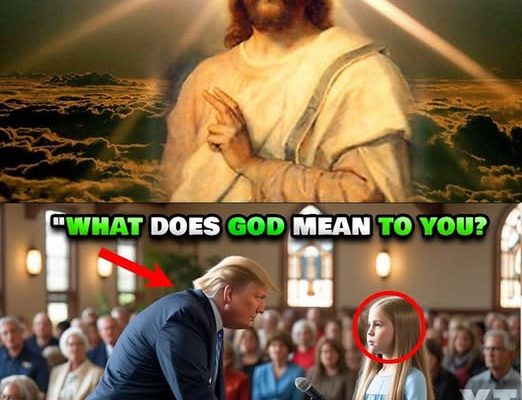In the quiet town of Shreveport, Louisiana, a church fellowship hall was buzzing with an unusual energy. The space, typically reserved for Sunday potlucks and Bible study, was filled with the sound of folding chairs scraping against the polished floor and murmured conversations. At the front of the room stood Donald Trump, his unmistakable presence filling the modest hall. His orange-tinted complexion and signature hand gestures were familiar to everyone, but tonight, he was uncharacteristically subdued, perhaps sensing the gravity of the event.

The audience was a mix of families, retirees, and local residents, all curious to hear what he had to say. Among the crowd was an eight-year-old girl named Lily, dressed in her best Sunday dress and clutching an old leather-bound Bible to her chest. The Bible was a treasure passed down from her late grandmother, its pages worn and its gold lettering faded. Lily’s mother had whispered to her before they arrived, “You can ask him, but only if you’re brave enough and only if you truly mean it.” Lily had nodded, her heart pounding in her chest. She had been rehearsing her question for weeks, scribbling it out in her notebook during recess and murmuring it to herself as she lay in bed at night. It wasn’t a question born from childish curiosity but one that weighed on her soul.

As the evening progressed, Trump spoke about his usual topics—policies, achievements, and the future of America. The crowd occasionally clapped or nodded in agreement, but the energy was tepid compared to his usual rallies. Lily waited, her small hands gripping the edges of her Bible tighter with each passing minute. Finally, the floor opened for questions. A line quickly formed with adults eagerly stepping forward to ask about local issues, national policies, and even a few compliments about his iconic red tie.
Lily hesitated, her tiny frame shrinking further into her seat. But when her mother gave her a subtle nudge, she knew it was her moment. Her legs felt wobbly as she stood, her heart thundering so loudly she was certain the entire room could hear it. The line seemed endless, but as she inched forward, the room’s chatter began to fade. People noticed her—the small girl with the oversized Bible clutched tightly to her chest. Whispers rippled through the crowd. When her turn came, Trump looked down at her, his expression momentarily softening. “And what’s your question, young lady?” he asked, his voice surprisingly gentle.

Lily swallowed hard, gripping her Bible so tightly her knuckles turned white. Then, with a voice that trembled but refused to break, she asked the question that had been echoing in her heart for months. “Mister Trump, what does God mean to you?”
The room fell into an immediate and complete silence. Eyes darted between the girl and Trump, the weight of her question pressing down on everyone like a tangible force. For a man known for his rapid-fire answers, Trump didn’t respond right away. Instead, he looked at her, then at the Bible in her hands, and something in his demeanor shifted. But before he could speak, the air in the room seemed to thicken with expectation, drawing everyone to the edge of their seats. Trump’s silence was almost deafening for a man who had built his career on quick comebacks and unwavering confidence. This pause felt unusual.
He stared at Lily for a long moment, his usual bravado replaced by something softer, almost vulnerable. The Bible she clutched caught his eye again, and his lips parted, but no words came. Lily shifted slightly, her small frame looking even more fragile under the room’s collective gaze. Her question had not been meant to challenge or provoke; it had been honest, borne from a deep yearning to understand something larger than herself. And somehow, that sincerity was louder than any political debate or shouted slogan. The crowd remained hushed, even the creaking of chairs or the muffled cough seemed to vanish as though the very air was holding its breath.
Trump finally raised his hand slightly, as if to steady himself, and leaned against the podium. “That’s a big question,” he began, his voice lower and steadier than usual. “And it’s not one I’ve always had the answer to.” The admission surprised many. Trump, known for his unshakable confidence, was admitting uncertainty in front of a crowd. He looked back at Lily, and his expression shifted again, this time to something almost paternal.
“When I was about your age,” he continued, “I had a lot of questions about God too. My parents would take me to church every Sunday. I remember sitting in those pews, staring at the stained glass windows, wondering if God was even listening to me.” He paused again, this time glancing out at the audience as though gauging their reaction. His hand rested on the edge of the podium, fingers tapping lightly against the wood.
“My father used to tell me,” he went on, “that faith is like a ladder. You climb it one step at a time, and sometimes you’re afraid you’ll fall, but you keep climbing because there’s something up there worth reaching for. At the time, I didn’t understand what he meant. I thought it was just something he said to keep me quiet.” A faint chuckle rippled through the audience, breaking the tension just slightly. Lily, however, didn’t smile. Her eyes remained fixed on him, waiting for the real answer she had asked for.
Trump leaned forward slightly, his tone softening even more. “But as I got older, life threw a lot of challenges my way. I faced losses, failures, and moments where I wasn’t sure if I could keep going. In those times, I didn’t always feel like God was with me. Sometimes I was angry at him; other times, I thought maybe he’d given up on me altogether.” The room remained captivated. It wasn’t the usual polished rhetoric or rehearsed lines they were used to hearing. This was something raw, something real.
“But I’ll tell you this,” Trump said, his voice firming up slightly. “Even in my worst moments, when I thought I was alone, I realized that faith wasn’t about always having the answers. It’s about believing that even when you don’t see the whole picture, there’s a purpose. There’s something greater at work.” He glanced back at Lily, whose grip on the Bible had loosened slightly. Her wide eyes glistened under the fluorescent lights.
“And God, to me,” he said slowly, “is that purpose. He’s the reminder that even when we fall, even when we fail, we’re not done. He’s the one who keeps telling us to climb the ladder even when it feels like it’s going to break.” But before the weight of his words could fully sink in, Lily’s eyes welled up with tears, and the crowd began murmuring softly, sensing that something extraordinary was unfolding.
Lily’s tears came quietly at first, a single drop sliding down her cheek as she clutched her grandmother’s Bible tighter against her chest. But then, as Trump’s words lingered in the air, her shoulders began to tremble. The crowd noticed, their whispers growing louder, yet no one dared interrupt the moment. Her mother leaned over instinctively, placing a comforting hand on her back. “It’s okay, sweetheart,” she whispered softly. But Lily shook her head. This wasn’t sadness; it was something far deeper. Trump had spoken words she hadn’t known she needed to hear, and in doing so, he had touched a part of her young heart she had long guarded.
Trump seemed to notice her reaction and took a step away from the podium, his face uncharacteristically subdued. “What’s your name?” he asked gently. “Lily,” she stammered, her voice barely above a whisper. “That’s a beautiful name,” he said with a faint smile. “You know, Lily, sometimes the simplest questions are the hardest ones to answer. And sometimes those questions remind us of what really matters.”
Lily nodded, her tear-filled eyes never leaving his. “My grandma used to say that too,” she said softly. “She said God is always listening, even when you don’t hear him.” Trump’s expression flickered with something unspoken, a mix of admiration and understanding. He took a deep breath, turning his attention back to the crowd.
“You know,” he said, “this little girl just asked a question that most adults are too afraid to ask. What does God mean to us? It’s not an easy question because it makes us look inward. It makes us face our fears, our doubts, and our flaws.” The room was utterly still, the weight of his words pressing down on everyone. For a moment, it felt as though Lily wasn’t just a little girl with a Bible; she was a symbol of something much bigger. Her courage had shifted the tone of the entire evening, transforming it from a routine town hall into a deeply personal reflection on faith and humanity.

Trump continued, his voice steady but softer than before. “We live in a world where we’re always looking for answers outside of ourselves. We think power, success, or money will fill the gaps, but they don’t. The real answers are the ones that make us uncomfortable, the ones that make us ask, ‘What do I stand for? What do I believe in? And who am I when no one else is looking?’” He paused, his gaze returning to Lily. “Thank you for reminding me of that, Lily. You’re wiser than most adults I know.”
The crowd erupted into soft applause, but Lily didn’t seem to notice. Her tears had stopped, replaced by a look of quiet pride. She wiped her cheeks with the sleeve of her dress and looked up at her mother, who smiled back at her with glistening eyes of her own. But as the applause subsided, Trump’s tone shifted once more, hinting that this conversation was far from over and that the room was about to be pulled even deeper into his story.
The room grew quieter still, as though the air itself was waiting for Trump’s next words. He shifted slightly at the podium, his eyes scanning the crowd before resting back on Lily. There was a heaviness in his expression, a weight that seemed to come from somewhere deeper than politics or public life.
“When I was a young man,” Trump began, his voice softer now, “there was a time I thought I had it all figured out. I had ambition, plans, and the drive to succeed. But there was one moment in my life, just one, that made me realize how little control I actually had.” He paused, letting the words sink in. The crowd leaned forward, their curiosity palpable. Trump rarely opened a window into his personal life, and now it seemed he was about to.
“My brother Fred,” he continued, “he was one of the kindest, most genuine people I’ve ever known. He had a light about him, a goodness that I couldn’t quite understand at the time. But Fred struggled. He had his demons, and no matter how much my family and I tried to help him, it wasn’t enough.” Trump’s voice faltered for a brief moment, and he cleared his throat. “When he passed away, I was angry—angry at him, angry at myself, and angry at God. I couldn’t understand why someone so good, someone with so much potential, had to leave this world so soon.”
Lily’s gaze remained fixed on him, her young face etched with an expression far too wise for her age. Around the room, others looked equally captivated, their expressions a mix of empathy and intrigue. “For a long time after that,” Trump continued, “I turned away from God. I thought if he was real, why would he let that happen? Why would he take someone like Fred and leave me behind?” He exhaled deeply, his hand gripping the edge of the podium.
“But then something changed. I don’t know if it was a dream or just a memory, but one night I saw Fred’s face in my mind. He was smiling this big goofy smile he used to have, and I heard him say, ‘Don’t be angry, Don. You’ve got work to do.’” The crowd was silent, the weight of his words pressing on them like a physical presence. Even the faint sound of cars passing outside seemed to vanish, leaving only Trump’s voice and the collective beating of hearts.
“I realized then,” he said, his voice steadying, “that faith isn’t about understanding everything. It’s about trusting that there’s a reason, even when you can’t see it. And maybe, just maybe, Fred’s purpose was to teach me that.” He turned back to Lily, his expression softening. “So when you ask me what God means to me, I’ll say this: He’s the reason I keep going, even when it’s hard. He’s the reminder that we’re here for more than just ourselves, and He’s the one who gives us hope, even in the darkest times.”
Lily’s eyes shimmered again, but this time her tears didn’t fall. Instead, she stood a little taller, clutching her grandmother’s Bible with both hands as though it were the most precious thing in the world. But just as the room seemed to settle into the gravity of his story, someone in the audience raised their hand, breaking the silence and pulling everyone’s attention in a new direction.
A man near the back of the hall stood slowly, his hand still raised. His rugged face, lined with years of hard work, bore a serious expression. He was the kind of person you might pass on the street without a second thought—a mechanic, a father, maybe someone who attended church sporadically when life allowed. His voice, however, cut through the stillness like a bell.
“Mister Trump,” he said, his words measured and deliberate, “I’ve spent years trying to figure out my own faith. Hearing you talk about it like this—about anger, doubt, and hope—it makes me wonder if all of us have been too afraid to admit we’re struggling. Do you think that’s part of the problem?”
The question seemed to catch Trump off guard, but he didn’t hesitate for long. He leaned slightly on the podium, his gaze meeting the man’s. “You know,” he began, “I think a lot of us are afraid to admit we’re not as strong as we want people to think we are. Faith isn’t easy. It’s messy, it’s complicated, and sometimes it feels like you’re just shouting into the void. But the truth is, that’s what makes it so powerful. It’s not about being perfect; it’s about trying, even when you don’t have all the answers.”
The man nodded, his expression softening as he sat back down. A murmur of agreement rippled through the crowd, but it was Lily’s voice that broke through next. “My grandma used to say faith is like planting seeds,” she said, her words clear and steady despite her small frame. “You don’t always see them grow right away, but you have to believe they will.”
Trump smiled, a genuine, almost tender expression that seemed to transform his usually guarded demeanor. “Your grandma sounds like a very wise woman,” he said. “And she’s right. Faith is a seed. It doesn’t always sprout the way you expect, but that doesn’t mean it’s not there, growing in ways you can’t see.”
The conversation seemed to breathe new life into the room. People began to nod, share glances, and even whisper quietly to those sitting beside them. What had started as a structured town hall had shifted into something far more personal—a shared reflection on life’s challenges, doubts, and moments of grace.
An older woman, her silver hair pulled back into a neat bun, raised her hand next. “I lost my husband last year,” she said, her voice trembling. “I’ve been angry at God ever since. I feel like I’ve lost my faith entirely. Do you think it’s too late to find it again?”
Trump stepped closer to the edge of the stage, his voice soft but steady. “It’s never too late,” he said. “Faith isn’t something you lose forever. It’s something that waits for you, and sometimes it’s in the quietest moments, when you least expect it, that it comes back to you.” The woman nodded, tears glistening in her eyes. Around the room, others looked equally moved, some dabbing at their faces with tissues, others simply sitting in reflective silence.
But as Trump’s words settled into the hearts of those in the room, it became clear that the evening wasn’t just about questions and answers anymore. It was about connection. And what came next would only deepen that bond. The room felt electric now, not with noise but with a palpable energy of shared vulnerability. People who had come expecting a routine political talk were instead part of something deeply personal. It was as if Lily’s simple question had opened a door that no one had dared approach before, and now no one wanted to turn back.
Trump straightened, his gaze sweeping the room. “You know,” he said, “there’s something I’ve learned over the years. Faith doesn’t always show up in grand moments. It’s in the small ones—the times when someone lends a hand, listens when you’re hurting, or asks a question as brave as Lily’s. Those moments remind us of what matters.” The audience was silent, hanging on every word. Trump’s voice, so often commanding and unyielding, now carried a humility that struck a chord. He gestured toward Lily. “This little girl reminded me tonight that faith isn’t just something we talk about; it’s something we live. And when we live it,” he said, his voice firming up slightly, “it spreads.”
At that, Lily smiled faintly, her cheeks still flushed from earlier. Her mother pulled her close, whispering something in her ear that made the girl’s smile widen just a bit more. Trump’s tone grew firmer. “We’re living in a time when it feels like the world is pulling us apart—politics, opinions, differences. But faith—faith has the power to bring us together. It’s not about being the same; it’s about understanding that we’re all climbing that same ladder, one step at a time, no matter how different our paths look.”
A ripple of applause began, slow at first but gaining momentum. People stood, clapping not just for Trump but for the moment itself—for the courage it had taken Lily to ask her question and for the answers it had drawn out of everyone in the room. As the applause subsided, Trump leaned in one last time.
“So tonight, I’ll leave you with this: Ask yourselves what faith means to you, and don’t be afraid of the answer, no matter how uncertain it might be. Because faith isn’t about knowing; it’s about believing.” He paused, letting the weight of his words settle before adding, “And if you found something tonight that touched you, hold on to it. Let it grow, and share it with the people who need it most.”
The room erupted in applause again, but this time it was punctuated with hugs, handshakes, and even a few tears. Strangers who had entered the hall with little more than polite nods now lingered, exchanging smiles and stories. It was as if a collective weight had been lifted, replaced by a quiet hope.
Lily, now standing with her mother, watched Trump step away from the podium. He walked over to her, kneeling slightly so they were eye to eye. “Thank you, Lily,” he said, his voice low but sincere. “You’ve got more courage than most people twice your age. Don’t ever lose that.” She nodded, her small hand extending to shake his. “Thank you, Mister Trump,” she said, her voice steady now. “For answering.”
Trump stood, giving her a faint smile before turning back to wave at the crowd as he exited. The room remained alive with chatter, the people clearly changed by what had just unfolded. Lily looked up at her mother, her voice soft but determined. “Grandma would have been proud, wouldn’t she?” Her mother smiled, tears welling in her eyes. “She would have been more than proud, sweetheart. She would have been amazed.”
As the hall slowly emptied, the lingering message was clear: Sometimes the bravest questions lead to the most unexpected answers. And in those answers, we find the pieces of ourselves we didn’t know were missing. If this story touched your heart, take a moment to reflect on your own faith and share it with someone who might need it today. And don’t forget to subscribe to our channel for more stories that inspire, challenge, and bring us closer together.



